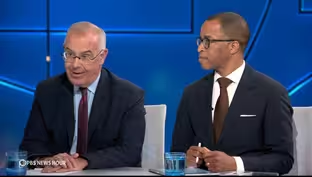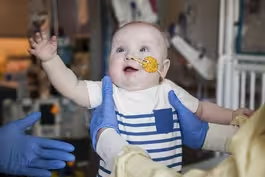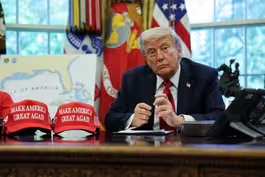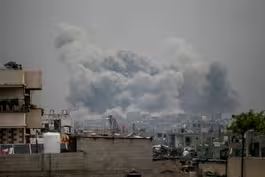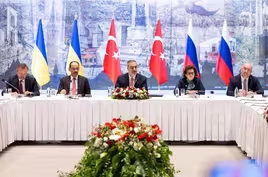
Ocean Vuong explores chosen family and kindness in new novel
Clip: 5/16/2025 | 6m 54sVideo has Closed Captions
In 'The Emperor of Gladness,' Ocean Vuong explores chosen family and acts of kindness
He’s a writer who mines his own history to look deeply at broader currents of working-class American life. In his new novel, Ocean Vuong crafts a narrative that weaves together themes of grief, healing and resilience. Senior Arts Correspondent Jeffrey Brown sat down with Vuong to discuss "The Emperor of Gladness" for our arts and culture series, CANVAS.
Problems playing video? | Closed Captioning Feedback
Problems playing video? | Closed Captioning Feedback
Major corporate funding for the PBS News Hour is provided by BDO, BNSF, Consumer Cellular, American Cruise Lines, and Raymond James. Funding for the PBS NewsHour Weekend is provided by...

Ocean Vuong explores chosen family and kindness in new novel
Clip: 5/16/2025 | 6m 54sVideo has Closed Captions
He’s a writer who mines his own history to look deeply at broader currents of working-class American life. In his new novel, Ocean Vuong crafts a narrative that weaves together themes of grief, healing and resilience. Senior Arts Correspondent Jeffrey Brown sat down with Vuong to discuss "The Emperor of Gladness" for our arts and culture series, CANVAS.
Problems playing video? | Closed Captioning Feedback
How to Watch PBS News Hour
PBS News Hour is available to stream on pbs.org and the free PBS App, available on iPhone, Apple TV, Android TV, Android smartphones, Amazon Fire TV, Amazon Fire Tablet, Roku, Samsung Smart TV, and Vizio.
Providing Support for PBS.org
Learn Moreabout PBS online sponsorshipGEOFF BENNETT: He's a writer who draws deeply from personal experience to explore the wider story of working-class life in America.
In his latest novel, just released, Ocean Vuong blends grief, healing, and resilience into a powerful and poetic narrative.
Senior arts correspondent Jeffrey Brown sits down with him for our arts and culture series, Canvas.
OCEAN VUONG, Author, "The Emperor of Gladness": There's just something connected to the brain with the way the hand moved.
JEFFREY BROWN: He writes by hand.
OCEAN VUONG: When you're writing by hand, every sentence takes about 10, 15 seconds longer.
JEFFREY BROWN: Types drafts on a vintage typewriter.
In an age of instant output, poet and novelist Ocean Vuong takes the long way in.
His latest novel, "The Emperor of Gladness," is a meditation on pain, unexpected acts of kindness, and a reckoning with the history that shaped him personally.
OCEAN VUONG: I have always been fixated on kindness without power.
There's so many people in America who don't have the means to alter each other's lives, the communities that I grew up with, working-class poor folks, who don't have money or positions or means to rescue each other, and yet I have watched people still commit themselves to kindness, even though that they know it won't change anything.
JEFFREY BROWN: An immigrant from Vietnam, Vuong, now 36, spent most of his childhood in a working-class community in Hartford, Connecticut, much like the one where he set his novel, a fictional New England town called Gladness, where his young protagonist, like Vuong himself, is shaped by a postindustrial landscape after the 2008 financial meltdown and the ongoing opioid crisis.
OCEAN VUONG: I saw the opioid epidemic before it was this convenient term used by politicians.
I saw lunch ladies over those overnight, teachers, your friend's mom, everyday Americans who lost themselves to this drug so quickly.
It's kind of this pharmaceutical slaughter, wherein they were so ashamed of it.
JEFFREY BROWN: Vuong also tapped into another aspect of Americana he himself experienced, working in fast-food restaurants, for him, part of the illusion of the American dream, but one offering a different kind of family.
OCEAN VUONG: The fast-food restaurant is all about deception.
We truly didn't cook anything.
We were one giant microwave.
But we presented our food as if it was home-cooked, it was made by some grandmother in the back, like -- you know.
And so there was the... JEFFREY BROWN: That's the myth of it, right?
It's fast-food, but it was made by grandma in the back, right?
OCEAN VUONG: It's, like, impossible, right?
A lot of this country is founded on the nuclear family.
And one alternative to that, you can say, is the found family, chosen family.
But there's a huge sector, I think, I wanted to tap into, which is the circumstantial family, the family at work, the family cobbled arbitrarily together during a shift.
And there's an intimacy and bond and kinship there that actually corrodes ideology.
We all had different politics.
We came from different parts of life.
JEFFREY BROWN: Where we all come from and how we got here is a longtime obsession of Vuong's, a subject of his poetry in two volumes, "Night Sky With Exit Wounds" and "Time Is a Mother" and an earlier novel, "On Earth We're Briefly Gorgeous."
He's often tackling the feeling of being an outsider, queer, an immigrant, and, as he puts it, caught in tragic history,descended from an American grandfather who served in the Vietnam War and a Vietnamese grandmother.
How much of that past history still lives on and kind of finds itself even into a story of your -- of a young man living in Hartford, Connecticut?
OCEAN VUONG: History doesn't leave us.
I think history is something that we pass through, and it's almost like a -- this web you pass through, like a spider's web.
You pass through a spider's web and it clings to you.
I have been caught by history.
I have also been made by history.
I joke and I say, suffering is diverse in this one, many lineages of trouble.
But... JEFFREY BROWN: But, sometimes, you bring it to the surface in different ways, right?
OCEAN VUONG: Yes, because I think we don't get to choose how we're -- how we get a life.
And we don't get to choose whether we're victims or not.
But we do get to choose whether we live in victimhood.
And I think, for me, being a writer, creating stories is my way of saying I'm not marked by my history.
But, also, there's no solution to my history.
There's no easy way to say that the Vietnam War cost millions of Vietnamese lives, thousands of American soldiers who did not want to fight in this war, drafted against their will.
And yet I owe my life to such a black page in history.
JEFFREY BROWN: A rich history and a literary voice that has resonated with students -- he's a professor at NYU -- and with many readers, especially in this moment.
While Vuong didn't set out to become a public voice, he finds himself settling into that role.
You are representing people and you are speaking for people whether you like it or not.
OCEAN VUONG: Whether you like it or not.
And so you have to now put more care and concern into the words.
And then I thought, oh, but that's what I have been doing anyway as a writer, care and concern.
I mean, who wakes up and decides to maneuver one of the smallest, fragile mediums in our species as letters around the smallest fragile forms of a poem, who does that without care?
Writing is an act of care.
JEFFREY BROWN: Does it change the way you feel about yourself or you think about yourself as a writer?
OCEAN VUONG: The desire underneath all this that brings everything together is a central question in my life, trying to understand why there is so much suffering in our life as people, and yet why is there so much beauty?
Why do we suffer so much and yet have the capacity to recognize with absolute mystery and wonder the beauty of the world?
I don't know the answer, but I'm always writing towards that.
JEFFREY BROWN: For the "PBS News Hour," I'm Jeffrey Brown in New York.
Brooks and Capehart on Trump's Middle East policy shifts
Video has Closed Captions
Clip: 5/16/2025 | 10m 41s | Brooks and Capehart on Trump's Middle East policy shifts (10m 41s)
Gene editing treatment helps child born with rare disorder
Video has Closed Captions
Clip: 5/16/2025 | 6m 43s | Breakthrough gene editing treatment helps child born with rare disorder (6m 43s)
How the Trump family could be profiting off the presidency
Video has Closed Captions
Clip: 5/16/2025 | 9m 12s | Trump business deals revive questions about his family profiting off the presidency (9m 12s)
News Wrap: Israel strikes Houthi-controlled ports in Yemen
Video has Closed Captions
Clip: 5/16/2025 | 8m 38s | News Wrap: Israel strikes two Houthi-controlled ports and unleashes new barrage on Gaza (8m 38s)
Russia-Ukraine talks fall flat with few signs of progress
Video has Closed Captions
Clip: 5/16/2025 | 8m 45s | Russia-Ukraine peace talks fall flat with few signs of progress (8m 45s)
Providing Support for PBS.org
Learn Moreabout PBS online sponsorshipSupport for PBS provided by:
Major corporate funding for the PBS News Hour is provided by BDO, BNSF, Consumer Cellular, American Cruise Lines, and Raymond James. Funding for the PBS NewsHour Weekend is provided by...
